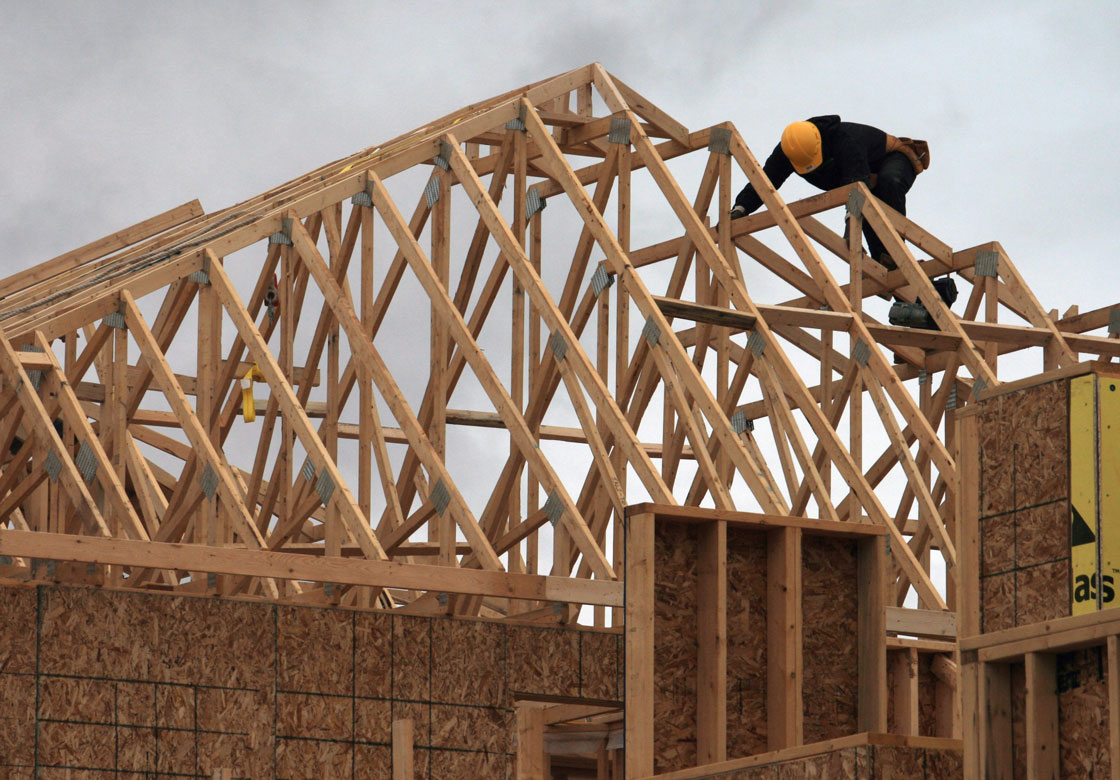OTTAWA – Canada’s much-scrutinized housing market showed signs of softening last month, with starts falling a little further than expected but still to levels many analysts consider too strong to sustain.

Canada Mortgage and Housing Corp. said Monday housing starts declined to an annualized rate of 192,235 in November, three per cent lower than October’s result and about 3,000 fewer than economists expected.
Most of the weakness was concentrated in Ontario, which saw a drop of 16.6 per cent, and in Atlantic Canada, where starts fell by a whopping 24.8 per cent. But condo building in British Columbia drove starts there up 12.5 per cent and the Prairies and Quebec saw gains of 9.1 per cent and 0.8 per cent respectively.
The Bank of Canada and the federal government have long fretted over housing in Canada, fearing that if it continues to rise above potential it will result in a sudden and damaging crash once interest rates start rising, triggering an overall economic slowdown.
Analysts say the ideal situation is for the market to slowly decline, but not crash and burn.
“It’s a step in the right direction but not aggressive enough — we need the number to go to about 180,000 (annualized),” said Benjamin Tal, deputy chief economist with CIBC World Markets.
“But this is not a housing market that is melting,” he added. “People who expected to see a crash and smoke will be disappointed.”
- What is a halal mortgage? How interest-free home financing works in Canada
- Capital gains changes are ‘really fair,’ Freeland says, as doctors cry foul
- Budget 2024 failed to spark ‘political reboot’ for Liberals, polling suggests
- Tesla’s net income drops 55% in first quarter amid falling global sales
Economists believe starts should average about 175,000-180,000 annually in order to absorb demographic growth in Canada.
Still, housing is moving in the right direction, analysts said. The market heated up somewhat during the summer and early fall, but November’s numbers suggest there has been a levelling off.
RBC economist Laura Cooper noted that despite the recent gains, starts so far this year have averaged 187,600, well below the 215,000 pace set for 2012 as a whole. She expects next year to settle in at about 180,000.
Also encouraging was the decline in condo construction in Toronto. Multiples fell by 21.4 per cent in Ontario, according to CMHC, although that mostly retraced the 27 per cent surge seen in October. Multiples fell even further, relatively speaking, in Atlantic Canada, which saw condo starts plummet by 41.6 per cent, but that also comes off a big number in September.
Tal said he expects condo construction in Toronto — one of the country’s hottest markets — has reached its limits.
“The cranes you are seeing in the skyline now are decisions that were made two years ago, but if you look what’s in the pipeline, you see significant downscaling,” he said. “Developers are realizing this market is already oversupplied and that you cannot just add to it if you want to maintain stability.”
Nationally, November’s pullback was evenly distributed between single family homes (down 3.1 per cent), and multiples, which declined 3.5 per cent.
In raw numbers, not annualized, there were 17,153 actual starts in November, down from 18,173 in November 2012.
Urban starts decreased by 3.4 per cent on a seasonally adjusted annual rate, while rural starts were flat.

Comments